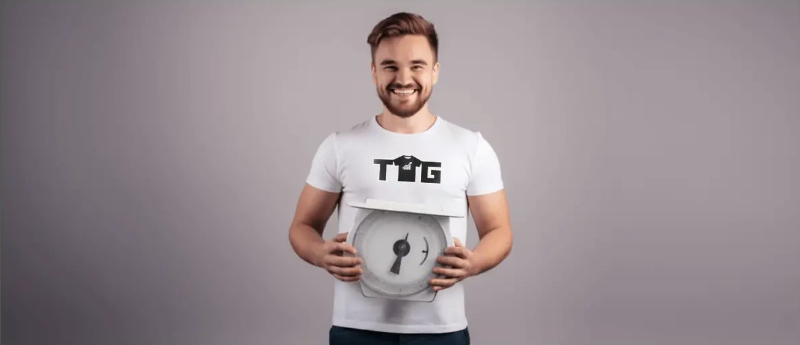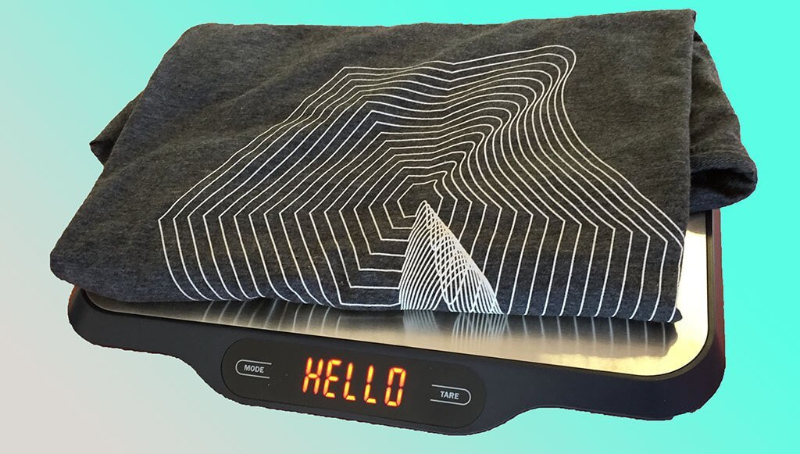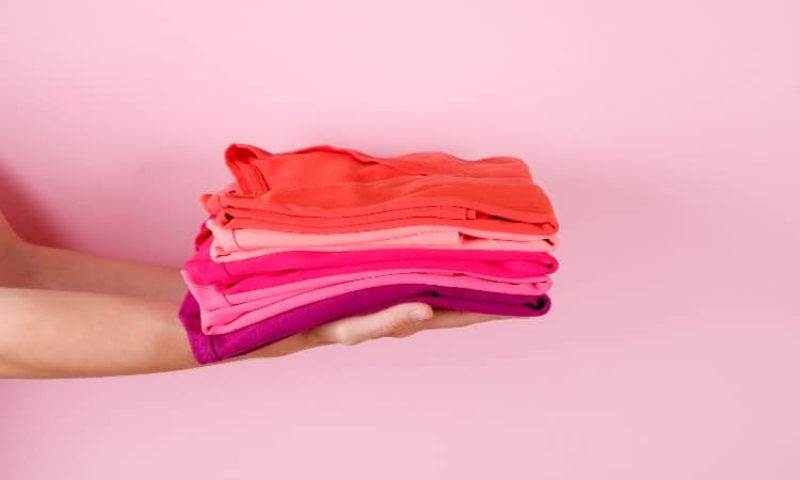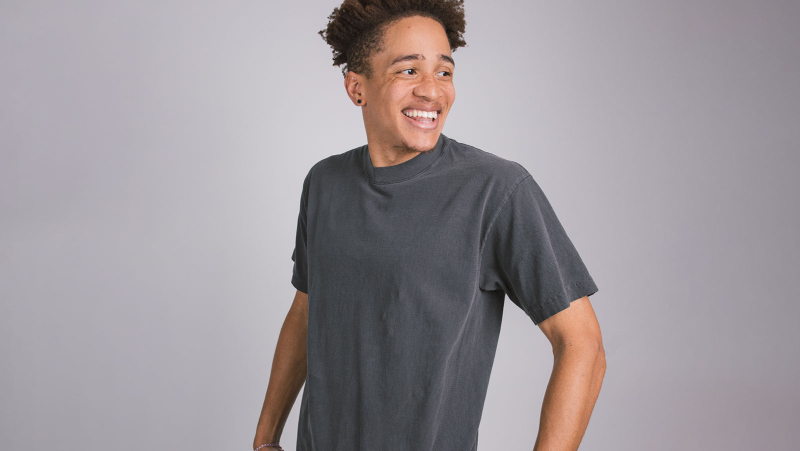Contents
When you choose a T-shirt, T-shirt weight is unlikely to be taken into consideration. Even so, how much a T-shirt weighs does affect the overall quality as well as the shipping cost of a T-shirt. To find the right T-shirt, you should now start paying attention to T-shirt weights, whether you are shopping for your own wardrobe or choosing the right blank for your T-shirt designs.
In the following, we will get the answer to “How much do t-shirts weigh” and understand how it might impact the overall quality, and what T-shirt weight is best for different purposes.
How much do t-shirts weigh?
The weight of a T-shirt can vary widely based on factors like material, size, and fabric thickness. Generally, a standard medium-sized cotton T-shirt weighs between 4.5 and 5.5 ounces (approximately 130–155 grams).
In broader terms, T-shirt weights can range from 85 to 195 grams (or 0.085 to 0.195 kilograms), depending on design specifics. Fabric weight is often measured in ounces per square yard or grams per square meter (GSM), which provides an additional reference for fabric density.
Why T-Shirt Weigh Matters?
Even when T-shirt weight is not the most important criterion that people take into consideration when choosing a shirt, it plays an important role in the overall wearing experience.
Comfort and breathability
For a summer clothing piece like a T-shirt, a more lightweight material might feel better on the skin. The lighter a material is, the more comfortable and more breathable the wear feels. Especially on hot summer days, a heavy-weight shirt might make you feel even more stifling and uneasy.
A lighter T-shirt that weighs around 4-5 oz is great to wear on a hot day or during extensive physical activities.
Durability
Apart from the comfort and breathability qualities, T-shirt weights also contribute greatly to the durability of a T-shirt. Lighter T-shirts with thinner and softer fiber are more prone to be damaged if it is stretched too hard or put into a harsh wash cycle. A thicker, heavier T-shirt is usually more resilient and durable than a regular lightweight T-shirt.
While thinner and lighter T-shirts might require special attention to take care of, a heavy-weight T-shirt can hold up better through all the tears and wear over time.
Style and fit
You can tell how much a T-shirt weighs just by looking at how the material drapes around the body. For example, the lighter-weight T-shirt tends to feature a more relaxed, slouchy draping fit, which appears to be more casual and sporty. On the other hand, heavier-weight T-shirts seem to appear sturdier and more structured, creating a clean, classic look.
Depending on the aesthetics and look you want to achieve, you can choose the right type of T-shirt with either flowy lightweight fabric or structured heavier fabric.
Print Quality
Lighter T-shirts are not made to handle large and bold prints. Its soft and flowy nature is more suitable for smaller prints with intricate details. Heavyweight fabrics offer the perfect and firm foundation for large and bold graphic designs.
T-shirt weight might affect how a design turns out. If you are looking for a T-shirt to print your designs on, you should pay attention to the fabric weight too.
Cost and Pricing
You might not believe it but the T-shirt weight can be closely related to the cost of a T-shirt. Normally, lightweight T-shirts are less expensive than heavy-weight T-shirts. Heavy-weight T-shirts usually cost more to produce, and they also look more premium when it comes to the quality, feel, and fit.
If you are selling T-shirts and want to be extremely competitive with the price, it is more sensible to go with lighter T-shirt options. And if you prioritize the quality of your products, you should look for more premium and heavyweight T-shirts.
Printing technique
The weight of a T-shirt fabric might also affect the decision of which printing technique to use. For example, lighter-weight t-shirts are suitable for digital printing and heat transfers due to their smoother surface.
But if you want to print with screen printing or embroidery technique, thicker and heavier weight T-shirts are more suitable. This type of material can stand multiple layers of printing from screen printing or handle the thick addition of threads from embroidery.
What factors affect T-shirt weight?
Here are all the factors that affect the overall weight of a T-shirt:
Fabric Weight
Fabric weight refers to the measure of the mass, density, or thickness of a fabric. It is typically expressed in terms of the weight of a given area of fabric, commonly specified in ounces per square yard (oz/yd²) or grams per square meter (GSM). The fabric weight provides valuable information about the fabric’s thickness, sturdiness, and overall feel.
Sizes
With the same material and the same fabric weight, the actual weight of a T-shirt might vary widely depending on the size of the T-shirt. Of course, the bigger the size is, the heavier it weighs. The varying weights in dependence on the sizes are particularly important when it comes to calculating shipping costs.
How to measure fabric weight?
Fabric weight is typically measured in ounces per square yard or grams per square meter (GSM). It can also be measured by “singles”.
Grams per square meter (GSM)
GSM is the standard weight measurement of fabric weight in the textile industry. This number means how much a square meter of a certain fabric weighs, which can be used to indicate the material’s thickness and density.
In simpler terms, a lower GSM suggests lighter and less dense material. Fabrics with high GSM are heavier, more dense, thicker, and generally more durable.
Out per square yard (oz/yd2)
Ounces per square yard (oz/yd²) is an imperial unit of measurement that refers to the weight of the fabric in ounces per square yard. This weight measurement is mostly used in the United States and other countries using the imperial system. It represents the weight of a fabric in ounces for every square yard of area. Similar to GSM, a higher oz/yd² value indicates a denser and heavier fabric.
Singles (Thread counts)
Unlike the two measurements above, singles are measured by counting the yarn, or more specifically, the number of times the yarn is twisted.
What do the thread counts have to do with the weight of the fabric? Well, the higher the singles, or the more times the yarn is twisted, the finer the yarn is. A finer yarn makes softer, smoother, and lighter fabric. On the other hand, the lower single count makes the fabric coarser and heavier.
Even though this measurement doesn’t directly reflect the weight of a material, it somewhat reflects the nature of the fabric. So when choosing the material for your T-shirt product, you should take this measurement into consideration, in addition to the GSM or oz/yd2.
What are the types of T-shirts based on their fabric weight?
For a normal consumer, it might be too complicated to read into the material weight specifications. That’s why we usually categorize material weights into 3 groups with simple names: Lightweight, midweight, and heavyweight.
Lightweight t-shirts
Weight: 120–150 GSM or 3.5–4.5 oz/yd²
Fabrics with weight within the range of 120-150 GSM are usually referred to as lightweight. It should be noted that lightweight material doesn’t inherently mean low quality and lack of durability.
In fact, lightweight materials are particularly favorable in the textile industry thanks to their outstanding quality that offers extreme comfort and versatility. Many premium T-shirt products are made from lightweight materials. They are especially thriving within the summer clothing market as well as the sports apparel industry.
Comfortable to wear during the hot weather: Lighter and thinner fabric allows the air to circulate through. Moreover, the lightweight fabric also produces less pressure on the skin.
- Easy to mix and layer: On colder days, a thin and lightweight material provides a layer of warmth yet not add too much weight to the overall outfit. It is also easy to layer with other clothing items for leveraging style and keeping the wearer warm.
- Casual and relaxed styles: Lightweight T-shirts and their relaxed and flowy silhouette create a casual style that is suitable to wear outdoors, during exercise, or hanging out.
- Breathable and quick-drying: Moisture-wicking nature makes the lightweight materials super-friendly to highly extensive physical activities. It absorbs and vapors sweat easily and keeps your skin dry all day.
- Easy to pack: Lightweight T-shirts are ideal for packaging for traveling or vacation. It helps to save more space and reduce the weight of your luggage.
- Lower shipping costs: The lighter T-shirts also mean lower shipping costs. It is highly beneficial for business owners who are selling T-shirts online.
However, there are a few issues that are common among lightweight t-shirts that you should also look into
- Prone to wrinkle: Lightweight T-shirts are more prone to wrinkling, which requires more time to flat out the fabric. It also affects the overall look and makes it less ideal for a formal setting.
- Less structure fit: T-shirts made from lightweight materials offer a more flowy and less structured fit. It might look flattering in some cases but if you are looking for a more boxy fit, there are better options than lightweight T-shirts.
- Subject to stretching: Lighter fabrics may stretch more easily. If you don’t take proper care of the item, the fit and shape can go downhill over time.
Lightweight T-shirt Blanks:
Classic Unisex T-Shirt Gildan 6400 (Made In US) (4.5oz/yd2)
Premium Unisex T-shirt Next Level 3600 (Made in US) (4.30z/yd2)
Unisex Jersey Short Sleeve Tee Bella Canvas 3001 (Made in US) (4.2 oz./yd²)
Medium-weight T-shirts
Weight: 150–180 GSM or 4.5–5.3 oz/yd²
Medium-weight T-shirts are slightly heavier than the lightweight version. Not too light, not too heavy, the medium-weight T-shirts strike a perfect balance between comfort and durability.
- Balanced comfort: Midweight T-shirts offers the best of both world – the comfort of lightweight shirts and the warmth of heavier ones, making them highly versatile and suitable for different weathers. You can wear them all year round.
- More structured, well-defined fit: These midweight pieces bring structure to the outfit. Thicker fabrics mean a leaner and well-defined silhouette. A more structured T-shirt will instantly leverage your outfit, giving it more fashion substance.
- Less wrinkle: Compared to the lightweight version, midweight t-shirts are less prone to wrinkle. It won’t get crumpled easily and will keep you looking sharp all day long. Feel confident to wear it all day around and still look neat and presentable without a wrinkle in sight.
However, midweight fabrics are not as breathable and moisture-wicking as lightweight ones. They might not be the best sidekick for blazing-hot weather. They’re not the breeziest, and heavy exercise might leave you feeling steamy.
Midweight T-shirt Blanks:
Classic Unisex T-Shirt Gildan 5000 (Made In US) (5.3 oz/yd²)
Unisex Mineral Wash T-shirt Colortone 1300 (Made in US) (5.3 oz/yd²)
Heavyweight T-shirts
Weight: 180–200+ GSM or 5.3–6+ oz/yd²
On the heavier side of the spectrum are heavyweight T-shirts. The thicker materials make them ideal to wear on the colder days. It gives you a layer of warmth and coziness while maintaining the comfort.
- Super durable: Heavyweight t-shirts are made to last longer than their lightweight counterparts. The heavier weight and thicker properties allow them to endure better against all the tear and wear. Even after years of use, they can still keep their forms and structures. You won’t have to replace them with a new one every now and then.
- Warmer to wear: For people living in the colder climate, heavyweight t-shirts offer a great companion – they keep you cozy yet comfortable and relaxed. Their light yet cozy quality makes them the perfect item for the fall-winter season.
- Structured fit: Heavyweight T-shirts remain a timeless essential fashion piece thanks to well-defined and structured silhouettes. Compared to the midweight version, heavyweight T-shirts lean towards the masculine side. It gives your outfit a bolder and more powerful look that is perfect for a classic, formal, and clean style.
- Luxury and opulent: Heavyweight t-shirts are the cashmere of the T-shirt world. Their maximum comfort along with outstanding durability is the definition premium T-shirt.
Despite being the VIP in the T-shirt world, heavyweight T-shirts aren’t made to serve in every situation. Their heaviness and thickness harness the air circulation, which is not the best to wear in scorching summer. They might be the last thing you want to put on to the gym or for a run. At best, they’re more suited for leisure strolls than sprinting marathons. Save them for flexing your style, not your muscles.
- High maintenance: These heavyweight t-shirts require extra care to keep them in their best condition. You don’t want to stretch or ruin the fabrics and forms of these t-shirts by casually throwing them into the washing machine. Remember that these heavyweight T-shirts can be hella expensive!
In the intricate dance of T-shirt weight, where ounces dictate breathability, durability, and style, the informed consumer navigates toward the perfect choice. Thus, as you delve into the realm of T-shirts, consider the weight not merely as a number but as a nuanced language, narrating a tale of comfort, durability, and personal style.
Heavyweight T-shirt Blanks:
Unisex Eco-friendly T-shirt Next Level 4600 (Made in US) (5.6oz/yd2)
Classic Unisex T Shirt Comfort Colors 1717 (Made in US) (6.1oz/yd2)
Heavyweight Adult Pocket T-Shirt Comfort Colors 6030 (Made in US) (6.1oz/yd2)
Colorblast Heavyweight T-Shirt Comfort Colors 1745 (Made in US) (6.1oz/yd2)
FAQs
1. What weight should I assume for shipping a shirt?
To weigh a shirt accurately, you should first learn how to use a scale properly. When weighing shirts for shipping, it’s best to round up (E.g: 1.1 to 2.0 ounces) because many shipping carriers charge based on rounded weight tiers.
A shirt can’t possibly weigh less than one ounce, so try weighing another object to make sure your scale is working correctly. You should assume a shipping weight of 6 to 8 ounces for a standard adult t-shirt packed in a poly mailer.
2. How do you convert pounds to ounces and grams when measuring t-shirt weight?
To convert t-shirt weight between pounds, ounces, and grams:
- 1 pound = 16 ounces
- 1 ounce ≈ 28.35 grams
- 1 pound ≈ 453.6 grams
So if a shirt weighs 0.5 lb, that’s 8 ounces or about 227 grams. Most standard t-shirts fall in the range of 6 to 8 ounces, depending on fabric and size which is around 140 to 230 grams.
For international shipping or cost comparison, using grams is helpful. For USPS or domestic shipping in the US, ounces are usually more relevant.
3. How many t-shirts can you get from a pound of fabric?
It depends on the fabric type and shirt size. Lightweight cotton fabrics like 160 GSM (grams per square meter) can yield about 1.5 to 2 shirts per pound. Heavier fabrics like 200 GSM may only produce 1 shirt per pound or less.
On average:
- 1 pound of cotton fabric = roughly 1 to 2 t-shirts
- The tighter and heavier the weave, the fewer shirts you’ll get
If you’re cutting and sewing your own garments, fabric waste, seams, and sizing will also affect the final number.









